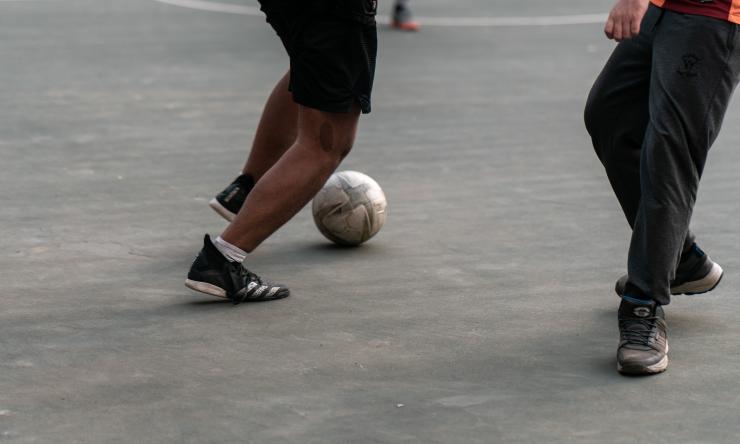Don’t lose focus: safety tips for adults playing contact sports
Adults can feel like kids again while staying active by playing team sports. While engaging in physical activity is crucial, people must take precautions when playing contact sports. An ophthalmologist and physical therapist provide tips for sports safety.
“With any sport that you may come into contact with a person or their hands or fingers, eye protection is important,” said Dr. Masih Ahmed, assistant professor of ophthalmology at Baylor College of Medicine.
Basketball is the leading cause of eye injuries in sports, so eye protection is recommended. Sports like racquetball require eye protection. Ahmed suggests wearing goggles made of polycarbonate or shatter-resistant plastic. Wearing glasses with UV protection from the sun and polarization to minimize glare can be beneficial when playing outdoor sports. Prescription goggles or racquetball glasses also are available options.
Protective gear is crucial for injury prevention as well, such as wearing shin guards in soccer. If you previously suffered a knee injury, a compression sleeve might be beneficial while playing sports. Hard knee braces can be worn in football, but they can cause further injury in soccer or basketball.
“Some sports are inherently more dangerous than others, but all contact sports have a high risk for injury,” said Melanie McNeal, physical and occupational therapy manager in the Joseph Barnhart Department of Orthopedic Surgery at Baylor. “Each sport has injuries that are more common. For instance, top injuries in basketball and soccer are ACL tears in the knee and ankle sprains.”
If you fall or are injured and experience pain, vision loss or see flashing lights or floaters, you should immediately see a specialist. These symptoms could be a sign of further injury, including retinal tear, which can lead to detachment and vision loss. Other ocular injuries include abrasions, hyphema (blood in eye) or orbital fractures.
Falling or hitting your head could result in a concussion. Symptoms include double vision, trouble tracking objects, foggy vision, headaches or not recalling events well. If you feel you might have a concussion, visit an expert specializing in head injury and vision. There are specialized assessments that athletes often take to establish a baseline so this can be compared in the event of a concussion.
“As we get older, we get stiffer and lose flexibility, therefore it takes us longer to loosen up and be prepared for high-intensity movements or activity that requires agility,” McNeal said. “Preventing injury is super important because it takes our bodies longer to heal when we get injured. We don’t bounce back like kids do.”
She recommends several tips for avoiding injuries:
- Get warm and be sweating by the time you start playing. Do active stretching such as lunges, jumping jacks or squats. For sports requiring agility, do sprints, walking leg kicks, skipping, jumping and cutting. You should also do the activities you will do while playing that sport.
- If you sit out for a while during the game, warm up again before going back in to keep the body warm.
- After you play, sit down, relax and passively stretch the body. Passive stretching includes lying on your back with a strap around your foot and pulling your leg up as close to 90 degrees as possible with the knee straight while holding the position for at least 30 seconds.
- Strength train, even if you play a sport multiple times a week. Strength training sessions will ensure your mechanics are maintained, and faulty mechanics lead to injury.
- Listen to your body. If you feel pain, stop and rest for a few days. If the pain does not subside, consult a physician or physical therapist before the pain intensifies.
People performing shoulder-heavy sports such as pitching in baseball or softball need to routinely perform rotator cuff and scapular stability exercises. Football players need entire body-heavy strength and power training. McNeal advises working with a trainer or finding short, specific workouts on YouTube.
“A focus on improving both strength and flexibility is really vital as we age, for the general population, and especially for those participating in sports,” she said.
Vision is critical when playing sports. If you cannot see the ball well or you come up short on your 3-pointer, get an eye exam. Signs you need a checkup include squinting or straining to focus your eyes. This can lead to headaches.
“Just because you have contacts or glasses or need to correct your vision doesn’t mean you can’t compete at the highest level. Pro athletes have eye conditions and play sports with corrective means all the time,” Ahmed said.










